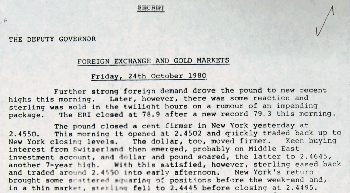The Bank of England's market reports
In the archives of the Bank of England lies a massive series of daily reports on the state of the markets, recording shifting sentiments towards sterling and UK government debt ('gilts') almost hour by hour. Written from the privileged perspective of the central bank, they quantify its interventions and - along with weekly summaries filed beside them - reveal its goals and tactics more completely than any other source.
Naturally these documents were held in the closest secrecy at the time. Here we begin to publish them in full for the Thatcher governments, the first tranche covering the years 1979-81.
overview: storytime at the bank

24 Oct 1980: sterling peaks against the dollar
There are two series in fact - the daily report on the Foreign Exchange and Gold Market, prepared by the Bank's own dealers, and the reports on the Gilt and other money markets, prepared by Mullens, the Government's brokers until financial deregulation ("the Big Bang") in 1986. These reports were written for internal consumption in the Bank, discussed daily but also in greater depth on a weekly basis for which a summary and overview was prepared, also available on this site.
Until 1980 the weekly discussion took place at a meeting dubbed, almost poetically, the 'Friday Story'. Following internal reforms considered epoch-making in the Bank, this became the 'Wednesday Story', but aside from the name, the meeting changed very little. Indeed continuity was personified: before and after reform the man who knew it all best was Eddie George, a chain-smoking, career staffer at the Bank who virtually pioneered the use of handheld devices in meetings in what seemed at the time an obsessive determination to monitor every development in the markets. (This was an age when Blackberry was still a fruit and Palm a tree.) He was a man who lived at the sharp end of things, and partly for that reason perhaps MT liked and trusted him, almost uniquely among Bank officials. She applauded when he became Governor a decade later, bringing to an end the long ascendancy of smooth grandees at the top of the Bank.
The Treasury did not send a representative to Storytime, but it did receive copies of the weekly reports, if not the dailies. It may have received daily figures on intervention (as opposed to the reports), and passed them to No.10 - Nigel Lawson's memoirs suggest as much - but precisely what the rest of central government knew of the Bank's daily operation remains to be determined. The Treasury's own archive is frustratingly unrevealing as to its dealings with the Bank. They seem to have felt the Bank sometimes left them in the dark as to what it was doing and thinking, a sentiment often reciprocated. Long before it acquired formal independence, in 1997, the Bank looks to have done all it could to preserve a degree of operational freedom of manoeuvre.
Foreign exchange & GOLD MARKET: storytime at the bank
There are two series in fact - the daily report on the Foreign Exchange and Gold Market,
Foreign Exchange & Gold Market reports
